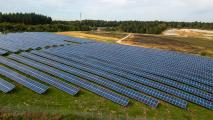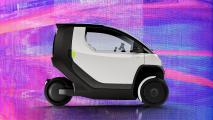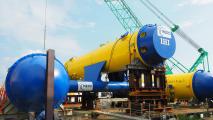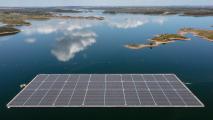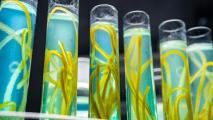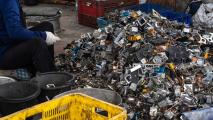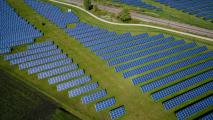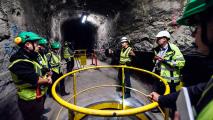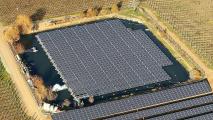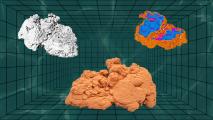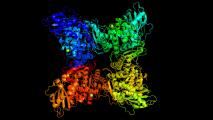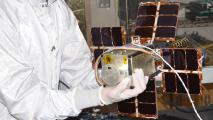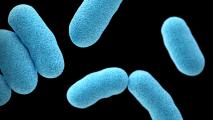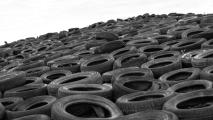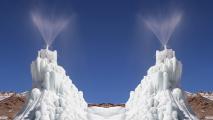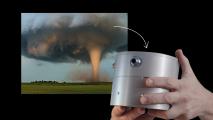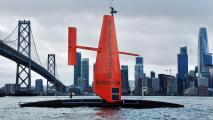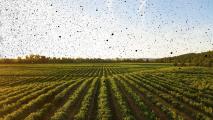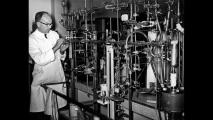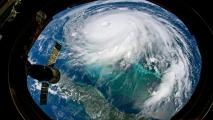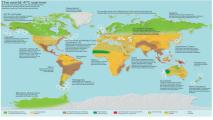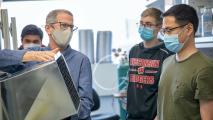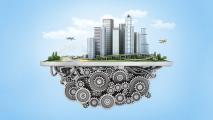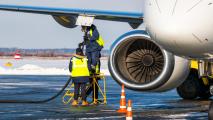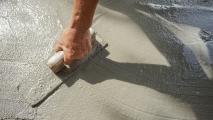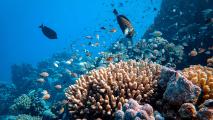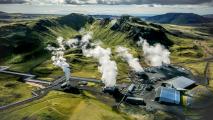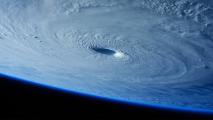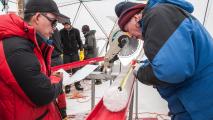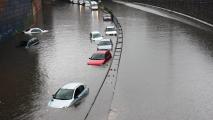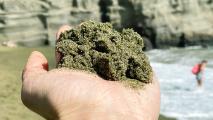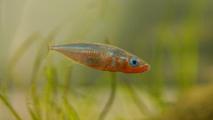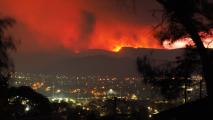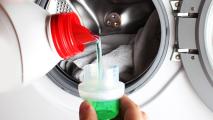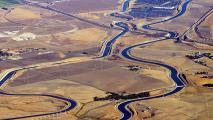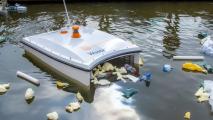Field: Climate Crisis
Alternative batteries are solving the biggest problem in renewable energy
The world is overcoming the problem of renewable energy storage with batteries made of water, sand, and more.
Walmart to rollout a fleet of electric delivery vehicles
Walmart has announced a deal to buy a fleet of delivery EVs from Canoo, with a pilot beginning in weeks.
“Passive cooling” could reduce indoor temps by up to 25 F in a heat wave
University of Oregon researchers have discovered that simple acts like drawing shades during peak sun and opening windows at night may help save lives during heatwaves.
MIT proposes Brazil-sized fleet of “space bubbles” to cool the Earth
A raft of “space bubbles” could be used to reverse global warming, according to an MIT group's solar geoengineering proposal.
A “Peter Pan” chemical could stop mosquitoes, without hurting other insects
Entomologist Naoki Yamanaka has an idea for how to handle mosquitoes: What if we just stop them from growing up?
Former landfills are becoming “brightfields”
US cities are covering the capped sites of former landfills with solar panels, turning the “brownfields” into “brightfields.”
After millennia of agricultural expansion, the world has passed “peak agricultural land”
This marks a historic moment in humanity’s relationship to the planet.
Satellites zoom in on cities’ hottest neighborhoods
In “micro-urban heat islands,” communities can experience heat wave conditions well before officials declare a heat emergency.
This compact electric vehicle wants to combine a scooter and a car
Nimbus is now taking pre-orders for its compact electric vehicle, which splits the difference between scooter and car.
Where does the plastic in our oceans come from?
Which countries and rivers emit the most plastic to the ocean? What does this mean for solutions to tackle plastic pollution?
Digital technology can cut global emissions by 15%. Here’s how.
The grand challenge for humanity is to ensure that groundbreaking technologies have a clear purpose for our planet.
Massive turbine turns deep ocean currents into electricity
Deep ocean currents could be an economically viable source of clean energy, based on a recently wrapped demo in Japan.
Portugal set to start up Europe’s largest floating solar park
Floating panels don’t require costly real estate and those on reservoirs used for hydropower are particularly cost effective.
What foods will 9.3 billion people be eating in 2050?
Algae, fried insects, and exotic lab-grown meat could all be on the menu.
A more efficient way of urban mining gold
Researchers at the Korea Institute of Science and Technology say they have developed the world’s most efficient way of urban mining gold
Solar + battery hybrids are poised for explosive growth
Solar panels and battery storage can generate renewable power when solar energy is at its peak during the day and then release it as needed.
Finland prepares world’s first “nuclear tomb”
Deep beneath Finland, a “tomb” for nuclear waste is set to be a test for geological disposal facilities.
3 emerging technologies that will give renewable energy storage a boost
The U.S. Department of Energy has predicted that renewable energy will be the fastest-growing U.S. energy source through 2050.
See the world’s first floating city: OCEANIX Busan
If the world's first floating city is a success, other coastal metropolises could use it as a blueprint for adapting to rising sea levels.
This German firm is building a floating solar plant on a quarry lake
A German company will switch on a floating solar power plant, a rapidly-installed, renewable technology that could help phase out oil.
3D-printed artificial coral reefs could save coastal fish
A new method for designing and 3D printing custom artificial coral reefs could make them more accurate stand-ins for the natural kind.
WWF report highlights tiger population gains for the Year of the Tiger
The global tiger population is finally increasing after more than a century of gradual decline, a new study from WWF reveals.
Chevrolet is electrifying the Corvette
GM has announced plans to bring the Corvette roaring into the electric vehicle market.
Bioluminescent bacteria will soon light up this French street
French commune Rambouillet is serving as a testing ground for the soft glow of bioluminescent bacteria on the street.
An ancient enzyme could supercharge photosynthesis
Researchers have resurrected an ancient version of the enzyme Rubisco in the hope of supercharging photosynthesis in today’s plants.
Big tech companies pledge nearly $1 billion toward carbon removal
The pledge is an advance market commitment — an economic strategy that's been used to increase vaccine coverage across the planet.
Unbelievably sensitive NACHOS satellite is ready to save lives
The cutting-edge NACHOS satellite will aid in our fight against climate change and potentially save hundreds of people from gruesome deaths.
Smart sensor tells you exactly when fruit will ripen — or spoil
Inside vast warehouses, millions of fruits sit and slowly ripen. To help packers know when fruit has got to go, a biotech startup is turning to small sensors.
Lasers from space create unique new map of Earth’s forests
A lidar instrument on the ISS has been used to create a near-global 3D map of the Earth’s biomass for conservation and climate research.
Methane-eating bacteria discovery could help capture gas from the air
A new discovery could kickstart efforts to engineer methane-harvesting bacteria, fight greenhouse emissions, and “mine” the air.
The West Coast wants to tap into the maple sugar market
Over 75% of the world’s maple syrup production is in Quebec. But with climate change threatening their seasons, West Coast producers are looking to tap in.
World’s first fully-recyclable wind turbine blade prototype debuts
Wind turbine blades are notoriously difficult to recycle, but researchers and industry players hope a new material design may change that.
Engineered bacteria convert CO2 into valuable industrial chemicals
Many industrial chemicals have a large carbon footprint. But scientists have engineered bacteria that ferments carbon dioxide from the air to make industrial chemicals
This company is tackling Kuwait’s ‘tire graveyard’ problem by tire recycling
Kuwait wants to build 25,000 new houses on the site of a former tire graveyard. Here's how they're going to do it.
Elon Musk: Europe should revive nuclear energy
The Ukraine crisis has highlighted Europe's dependence on Russia for fossil fuels. Is more nuclear energy the solution?
Digital sound archives can bring extinct birds (briefly) back to life
Sound recordings remind us that these beings are invaluable, and that humans have a duty to preserve them.
First solar canal project is a win for water, energy, air and climate in California
California’s aging power infrastructure has contributed to catastrophic wildfires and multiday outages. Solar canals can help.
Could electrocuting clouds be the key to making it rain?
By analyzing the energy within raindrops, researchers found that they could squeeze water from the clouds by electrically supercharging them - another step to control the weather.
Why pumping water back into hydro dams beats batteries for renewable power
The U.S. has thousands of reservoirs that could be paired for pumped hydro storage without the need for rivers.
Scientists propose mechanical trees to soak up CO2
Can we combine our two best ways to remove CO2 from the air?
Chile is making its own glaciers
Chilean climate experts will attempt to DIY their own glaciers in 2022, in hopes of supplying fresh water through the dry summer months.
Clay from kitty litter pulls methane emissions from air
A new technology for reducing methane emissions in the atmosphere relies on zeolite, a cheap, abundant clay found in cat litter.
Series|
Just Might Work
Tornado Alley miracle: A 100% accurate tornado sensor invented by accident
Can this recycled technology save the citizens of Tornado Alley?
Floating drones mine carbon data in the Gulf Stream
Saildrone has deployed three vessels into the Gulf Stream this winter to collect data on carbon uptake.
Citizen keepers are raising threatened grasshoppers
The large marsh grasshopper risks extinction. But volunteer citizen keepers are raising the insect for rewilding to newly restored wetlands.
Paris to make the Seine River swimmable for the Olympics
Paris’ plan to make its iconic Seine River swimmable for the 2024 Summer Olympics could help other cities clean up their own waterways.
The world’s first indoor saltwater farm
But Sam Norton, founder of Heron Farms, is using the world's most abundant resource — seawater — to grow sea beans.
Luminescent materials could cool our cities and light the streets
Luminescent materials could be used to cool our cities, and simultaneously cut down on electricity.
There's a ton of wind power in the deep sea. Let's go get it.
The most powerful winds can be found over the deep, open ocean. Floating wind turbines could tap into this and 100x our wind energy.
New tech “upcycles” junk plastic, reducing its carbon footprint
A chemicals and aircraft parts manufacturer has created a new method for converting low-grade plastic waste into oil, which they can turn into high-quality plastic.
Rock dust can turn farmland into a sponge for greenhouse gases
Spreading rock dust over large areas of farmland could cause the soil to absorb considerably more carbon from the air, while improving crop yields — a process called mineral weathering.
7 scientists we are thankful for this Thanksgiving
One of these scientists saved more lives than any other person in history.
The science of climate change in 6 charts
Here's what the science says about climate change — and a few reasons to be optimistic.
Can CRISPR keep the beer flowing?
Researchers are turning to CRISPR to create barley better able to remain dormant in climate change — while being still ready to make beer.
Here’s what the world will look like 4°C warmer
This map, which shows some of the effects a 4°C rise in average temperature could have on the planet.
Students get $5 million from Elon Musk for carbon-removal ideas
An Elon Musk-funded XPrize competition has given teams of students $5 million to develop ideas for carbon removal systems.
AI reveals that the Sahara actually has 1.8 billion trees and shrubs
AI analysis of satellite images sees trees and shrubs where human eyes can't.
Moving endangered species could save them — or turn them into invasive species
As climate change destroys ecosystems, some scientists propose helping animals pack up their bags and move to more hospitable parts of the world. But helping animals migrate is a complicated and fraught task. Now, some scientists want to lay the ground rules for assisted colonization, before the animals become refugees.
We need to rethink global food production to have a shot at our climate goals
Emissions from food alone could use up all of our budget for 1.5°C or 2°C – but we have opportunities to avoid this.
Climate transparency is about to get real with this independent database
A new independent database uses satellite data and AI to track global greenhouse gas emissions in near real-time, boosting climate transparency.
Climate tech is booming — and this is better news than COP26
It’s estimated that 65% of emissions reductions can be achieved by existing technologies. The other 35% will need to come from tech breakthroughs.
The world will electrify. This technology can power our sustainable future.
In partnership with Turntide
Attacking climate change requires reimagining our buildings and vehicles as intelligent systems. And it all starts with a smart motor.
Using AI to help save wine from wildfires
California startup Tastry is using its wine “tasting” AI to help save wines impacted by wildfire smoke.
We could see planes fueled by captured CO2 in 2022
Dimensional Energy, a startup based in New York, plans to use this new environmentally friendly jet fuel to conduct flight tests by 2022.
A robot boat tows kelp forests and sequesters carbon
The startup, Phykos, has sent a prototype of a solar-powered watercraft on a carbon-sequestering cruise in the Pacific Ocean, using an innovative kelp forest.
This new concrete soaks up a greenhouse gas
Engineers in Japan have discovered a new method for making concrete by recycling concrete rubble — and combining it with carbon dioxide drawn from the atmosphere.
Can sponge cities help us prepare for more floods?
Deadly floods are expected to get worse over the next decade. One design solution for cities is to make them more porous — like a sponge.
How oyster reefs protect against hurricane damage
Coastal cities are turning to eco-engineering to protect their coastline from storm surges and hurricane damage. Their floodwater solution: building oyster reefs to act as a natural breakwater.
Study suggests preserving food using tech developed for organs
By preserving food with isochoric freezing, we could improve quality and decrease energy usage in the frozen food industry, say scientists.
Can the woolly mammoth save Siberia from climate change?
Harvard geneticist George Church’s new de-extinction startup aims to resurrect the woolly mammoth to help combat permafrost thaw.
Probiotics could help coral survive the changing climate
A new study has found that probiotics can help corals fight coral bleaching.
How artificial clouds could save the Great Barrier Reef
Scientists conducted the first “cloud brightening” field experiment to artificially thicken clouds with seawater mist, creating shade for the Great Barrier Reef
The world’s largest direct air capture plant just opened
A partnership between Climeworks and CarFix just started the largest direct air capture plant, storing carbon dioxide in solid form deep underground.
Saving the ozone layer avoided 2.5 degrees of global warming
A new study shows that banning CFCs in the 80s also protected the depleting ozone layer and reduced the rate of global warming.
Is it possible to flood-proof the subways?
In the wake of Hurricane Ida and the flooded New York City subway system, can we rebuild flood-proof subway tunnels?
How to slay a hurricane
Hurricanes are becoming more powerful — can scientists engineer a way to weaken them and save lives?
Using body bags to treat heatstroke
The Pacific Northwest heat wave crushed hospitals with heatstroke victims. Doctors turned to body bags to save lives.
Ancient frozen viruses hold clues to life and climate
Using new techniques, researchers at Ohio State have identified ancient viruses we’ve never seen before.
3D-printed bridge reduces use of "most destructive material on Earth"
Researchers have found a way to reduce the CO2 emissions of a concrete bridge: remove the reinforcement. And the results are stunning.
Watching the moon’s “wobble” may help prevent flooding on Earth
A new NASA study predicts record flooding in the 2030s due to a combination of rising sea levels and a “wobble” in the moon’s orbit around Earth.
Oxford study: Move copper mining to dormant volcanoes
A more sustainable approach to copper mining may be digging wells under dormant volcanoes to suck out the metal-containing fluids below them.
To find leaking methane, ready the satellites
Researchers are using methane-hunting satellites to sniff out the potent greenhouse gas, helping to reduce methane emissions.
Hippos in tracking study unexpectedly contract anthrax
A study into the movement of hippos led to new research on anthrax outbreaks when some of the animals wearing GPS trackers contracted the disease.
Green sand beaches could erase carbon emissions
By spreading green sand all over a Caribbean beach, Project Vesta hopes to pull tons of carbon dioxide out of the atmosphere and lock it away for eons.
How subterranean microbes are devouring carbon emissions
Researchers at Pellissippi State Community College found naturally occurring microbes deep in the Earth’s crust are helping soak up CO2.
This machine will make seashells out of CO2
Scientists are building a machine that will suck carbon dioxide out of the ocean and turn it into seashells.
Startup plans to remove 1 billion tons of CO2 from the air
A new carbon sequestration startup plans to remove one billion tons of excess carbon from the atmosphere by 2035 using enhanced mineral weathering.
The Maldives are constructing a floating city to combat rising sea levels
Government officials of the island nation, Maldives, debuted plans to build the world's first fully floating city.
Genes show which animals will adapt to climate change
Some fish, such as the threespine stickleback, can respond to dramatic seasonal changes very quickly — genome sequencing reveals why.
How wonky cell phone signals help track wildfire smoke
An atmospheric oddity called a temperature inversion helped researchers discover how mobile phone signals could show the amount of bushfire smoke suffocating towns and cities.
How balloons could soak up carbon and fight climate change
A new startup plans to strap direct air capture technology to balloons and float them into the atmosphere to collect and store carbon dioxide.
This laundry detergent is made from recycled carbon
Consumer goods company Unilever is now selling a laundry detergent that’s made using recycled carbon instead of traditional fossil fuels.
Look at how much the planet has changed in four decades with Google Earth Timelapse
The new Google Earth Timelapse feature lets us scan the globe and look back from the present day to 1984 to see how human action and natural forces have changed the planet since the 1980s.
Rare wild coffee species brews hope for coffee’s future
A rediscovered coffee plant that can flourish in warmer climates, according to scientists, may be the future of coffee production, helping future-proof the morning ritual against climate change.
Solar canals in CA could save 63 billion gallons of water a year
Researchers looked into what it would take to cover California’s canals with solar panels and found that the benefits of solar canals outweigh the costs.
Can seaweed save the planet?
A Maine startup is growing vast quantities of seaweed and then burying them at the bottom of the ocean to sequester carbon for carbon offsets.
How tech helped beat back locust swarms in East Africa
Billions of locusts descended on East Africa in 2020, where new technology helped stop their spread.
Autonomous trash-eating boats clean up water pollution
New designs in autonomous boats, and a trash wheel that intercepts drifting trash, act as on-the-water trash-eating machines.
The world's whitest paint can cool your house — and the Earth
The whitest white paint reflects up to 98.1% of sunlight, which could make it useful for cooling homes in place of energy-hogging air conditioners.





